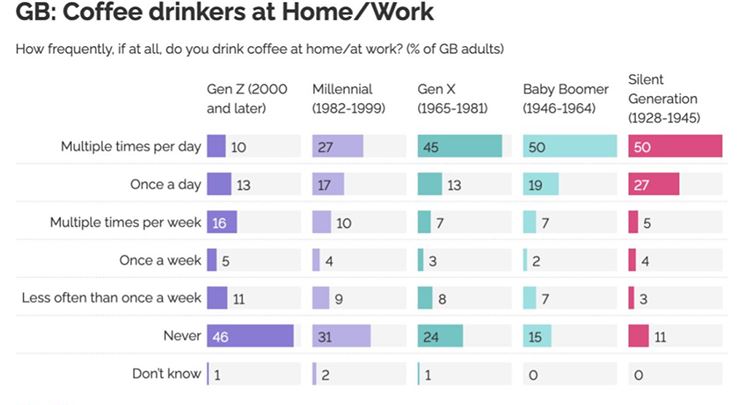Utah: Tillie Uribe, a kindergarten teacher from West Jordan, relies on caffeine to alleviate the first signs of a migraine. Her doctor recommended this approach, as caffeine can help ease the pain by narrowing blood vessels in the brain. For Uribe, this method often provides relief, though she remains mindful of its limitations. Late-day caffeine consumption can disrupt her sleep, and due to her history of peripartum cardiomyopathy, she needs to be cautious of its potential effects on her heart. This information is based on research from the University of California, Davis, as reported by The New York Times. Photo Credits: Getty Images.
Caffeine’s dual nature—both a potential remedy and a risk—is a common experience. Research on caffeine is extensive and often contradictory, with some studies highlighting its benefits and others pointing to potential downsides. To understand caffeine’s effects, it’s essential to explore its complexities and how it impacts individuals differently.
What is Caffeine?
Caffeine is a natural stimulant found in 60 different plants, including coffee beans, tea leaves, and cacao beans. It can also be synthetically produced and is commonly added to supplements, foods, beverages, and medicines. Dr. Brett Toresdahl, a sports medicine expert at the University of Utah Health, notes that caffeine is widely used to enhance performance by reducing fatigue and improving alertness.
The caffeine content varies significantly across different beverages. For instance, an 8-ounce cup of coffee generally contains between 95-200 milligrams of caffeine, while a 12-ounce can of cola has about 35-45 milligrams. Energy drinks can be especially potent, with some containing up to 200 milligrams per 12 ounces. Toresdahl emphasizes the importance of being aware of cumulative caffeine intake due to these variations.
Unexpected Sources and Effects
Caffeine’s presence extends beyond coffee and tea. It can be found in gums, energy bars, sports drinks, flavoured waters, and even some ice creams and yogurts. Chris Mohr, a fitness, and nutrition advisor, advises consumers to read labels carefully to avoid excessive intake.
Interestingly, caffeine consumption can influence behaviours beyond health. A study published in the Journal of Marketing revealed that caffeine before shopping can lead to increased spending, especially on indulgent items like scented candles and decor.
Understanding Personal Tolerance
Individual responses to caffeine vary widely. Sarah Dehoney, a pharmacist specializing in neurology, explains that some people can drink coffee before bed without issues, while others are affected by even small amounts early in the day. Symptoms of excessive caffeine intake can include rapid heartbeat, anxiety, irritability, and digestive issues.
Michelle Routhenstein, a cardiovascular dietitian, notes that while some people can tolerate several cups of coffee daily, others may experience negative effects. The “sweet spot” for caffeine consumption is different for everyone, and finding this balance is crucial to avoid adverse effects like dehydration or anxiety.
Moderation and Health Considerations
Dr. Toresdahl advocates for moderation, suggesting that excessive reliance on caffeine may indicate underlying issues like poor sleep or inadequate nutrition. Routhenstein and Dehoney both recommend limiting caffeine intake to avoid potential health risks, such as impaired nutrient absorption and negative interactions with medications.
Pregnant women are advised to keep caffeine consumption below 200 milligrams per day due to potential risks to the fetus. Additionally, caffeine can affect various medications, including antidepressants and thyroid treatments.
Caffeine in Medical Contexts
Caffeine has been used in various medical treatments, including for ADHD and certain types of headaches. Dr. Raj Dasgupta, a quadruple board-certified physician, notes that while caffeine has historically been used to manage ADHD symptoms, it is no longer a primary treatment option. It has also been used to improve lung function in asthma patients, though it should not replace prescribed medications.
Generational Coffee Consumption Trends
The coffee industry has seen significant shifts across generations. Baby Boomers tend to stick with traditional drip coffee, while Generation X is more open to espresso-based drinks and coffee shop experiences. Millennials prioritize specialty and sustainably sourced coffee, and Generation Z favors innovative, flavored beverages and digital coffee experiences.

Emerging trends include a growing focus on sustainability and health benefits in coffee products. Technology also plays a crucial role, with increasing use of mobile apps for ordering and loyalty programs.
Conclusion
Caffeine’s effects are complex and highly individual. Understanding personal tolerance, moderating intake, and being aware of potential interactions with medications are essential for managing its use effectively. As coffee culture evolves across generations, balancing tradition with innovation will be key for both consumers and the industry.